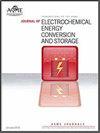Aging effect-aware finite element model and parameter identification method of Lithium-ion battery
IF 1.9
4区 工程技术
Q3 ELECTROCHEMISTRY
Journal of Electrochemical Energy Conversion and Storage
Pub Date : 2022-09-02
DOI:10.1115/1.4055463
引用次数: 0
Abstract
Battery aging is an inevitable macroscopic phenomenon in the use of the battery, which is characterized by capacity decline and power reduction. If the charging and discharging strategy does not adjusted with the aging state, it is easy to cause battery abuse and accelerate the decline. In order to avoid this situation, the aging model with consideration of the battery degradation is coupled into the pseudo-two-dimensional (P2D) model. An aging effect-aware finite element model that can describe battery physical information accurately is presented in this paper. The model parameters are divided into four parts: structure parameters, thermodynamic parameters, kinetic parameters and aging parameters. The identification experiments are designed based on the characteristics of these types of parameters. The decoupling and parameter identification methods of kinetic parameters according to the response characteristics of each parameter under specific excitation, and state of charge (SOC) partitioned range identification technology of aging parameters are proposed and verified. Finally, the aging effect-aware model and the identification parameters are verified under constant current (CC) and different dynamic conditions with different charge rate (C-rate). And the ability of the proposed model to track the aging trajectory in the whole life cycle is verified under various cycle conditions. The proposed model can be applied to aging mechanism analysis and health management from point of inner properties of the batteries.锂离子电池老化效应感知有限元模型及参数辨识方法
电池老化是电池使用中不可避免的宏观现象,其特点是容量下降、功率降低。如果充放电策略不随老化状态进行调整,很容易造成电池滥用,加速衰退。为了避免这种情况,将考虑电池退化的老化模型耦合到伪二维(P2D)模型中。提出了一种能够准确描述电池物理信息的老化效应感知有限元模型。模型参数分为结构参数、热力学参数、动力学参数和时效参数四部分。根据这几类参数的特点设计了识别实验。提出并验证了根据各参数在特定激励下的响应特性对动力学参数进行解耦和参数识别的方法,以及老化参数的荷电状态(SOC)分程识别技术。最后,在恒流(CC)和不同充电速率(C-rate)下,对老化效应感知模型和识别参数进行了验证。并在不同的周期条件下验证了该模型在全生命周期内跟踪老化轨迹的能力。该模型可从电池内部特性的角度进行老化机理分析和健康管理。
本文章由计算机程序翻译,如有差异,请以英文原文为准。
求助全文
约1分钟内获得全文
求助全文
来源期刊

Journal of Electrochemical Energy Conversion and Storage
Engineering-Mechanics of Materials
CiteScore
4.90
自引率
4.00%
发文量
69
期刊介绍:
The Journal of Electrochemical Energy Conversion and Storage focuses on processes, components, devices and systems that store and convert electrical and chemical energy. This journal publishes peer-reviewed archival scholarly articles, research papers, technical briefs, review articles, perspective articles, and special volumes. Specific areas of interest include electrochemical engineering, electrocatalysis, novel materials, analysis and design of components, devices, and systems, balance of plant, novel numerical and analytical simulations, advanced materials characterization, innovative material synthesis and manufacturing methods, thermal management, reliability, durability, and damage tolerance.
 求助内容:
求助内容: 应助结果提醒方式:
应助结果提醒方式:


